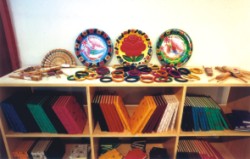 Fashion
Fashion
For Development
SRABONTI NARMEEN ALI
Clad in heavy jewellery, a simple blue top and
a matching woven toopee, Bibi Russel walked through
her new showroom in Banani, opened on January 23, 2004, with
ease and confidence. The showroom breathed craftsmanship, displaying
a vast variety of items, ranging from tie-die kurtas
and shawls to pillow cases and plates. Bangladesh's finest stood
proud: muslin curtains with handwork hung from the windows next
to placemats made from jute.
The showroom is presented by Essentials, and
has switched locations, and is now situated in Banani. It showcases
craftswork from different parts of Bangladesh, and some even
from Rajasthan in India. Except for the Rajasthani work, everything
in the showroom is designed by Bibi -- with a little help from
the friends she made during her frequent trips to the villages
of Bangladesh in the last two years.
"What I am trying to do is promote local
crafts under the banner of my name," says Russel. "After
agriculture, crafts is one of our biggest markets. The key is
to compete with local work in a global sphere. I believe I can
do that because I have made a name for myself in the International
fashion world."
"It's not about charity, it's about giving
back to these people who work hard and are never recognised,"
she continues. "In countries like ours fashion is like
a culture. We have to change the mentality of what fashion is
-- it is important in our every day lives. I make my line accessible
to everyone, so that it is something everyone can afford, and
not just a select few."
 Russel's
first education came at home, having "excellent parents"
who supported her dream of fashion, which she has been fostering
"from day one. Although she grew up in Bangladesh, she
graduated from the London College of Fashion and is now a Fellow
at the London Institute, the head of all art colleges in London.
Russel's
first education came at home, having "excellent parents"
who supported her dream of fashion, which she has been fostering
"from day one. Although she grew up in Bangladesh, she
graduated from the London College of Fashion and is now a Fellow
at the London Institute, the head of all art colleges in London.
Her
label, followed by the slogan "Fashion for Development
and recognised by the Fashion Council, provides her with the
opportunity to promote her own culture through fashion. Every
fabric in the show is originated from and handmade in Bangladesh,
such as jute and muslin.
"I never change the traditional way of
weaving that my craftspeople do," she says. "I just
simplify it -- I change colours and designs, and provide my
clients with different options"
"Love and affection is my strength. Although
I don't have a particular project or own any of these workers,
they are all mine, because I sit with them and improve certain
things or make adjustments myself. My first priority is taking
care of my work. I have never had anything sent back to me from
anywhere."
This concept paints a different picture of the
fashion industry from the usual confetti of glamour and jazz.
The running joke of most Miss World, Miss USA and Miss Universe
contestants saying that they want "world peace" (and
not really doing much about it) is not too far from the truth.
To Bibi Russel, however, it is no joke. She takes her work seriously
and strives to better the world around us by using her art.

 Fashion
Fashion Russel's
first education came at home, having "excellent parents"
who supported her dream of fashion, which she has been fostering
"from day one. Although she grew up in Bangladesh, she
graduated from the London College of Fashion and is now a Fellow
at the London Institute, the head of all art colleges in London.
Russel's
first education came at home, having "excellent parents"
who supported her dream of fashion, which she has been fostering
"from day one. Although she grew up in Bangladesh, she
graduated from the London College of Fashion and is now a Fellow
at the London Institute, the head of all art colleges in London.